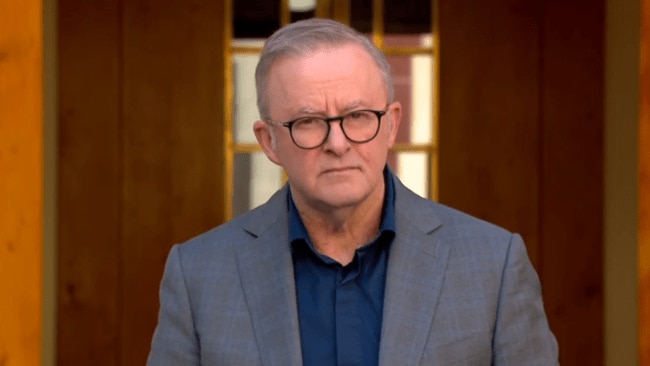Prime Minister Anthony Albanese has slammed the Coalition for “walking away” from the Paris Accord and labelled Peter Dutton as “worse than Scott Morrison” on climate change, despite the Coalition reaffirming its commitment to the agreement.
Prime Minister Anthony Albanese discussed the 2030 Paris Agreement amid Opposition Leader Peter Dutton saying the goal is unachievable.
“When we legislated for the 2030 and 2050 targets, what we did was we made sure there was ongoing accountability,” Mr Albanese said.
“Last December, we released the information in a transparent way done by the climate change authority.
“That showed we’re on track for 42 per cent by 2030 … the target is 43 per cent.”
Speculation arose over the weekend amid claims the Coalition would “rip up” the Paris Agreement and abandon net zero carbon emissions targets.
Opposition Leader Peter Dutton told the Weekend Australian he would oppose Labor’s 43 per cent carbon emissions reduction target by 2030 as he considered it unachievable.
The Coalition sought to clarify speculation over the Paris Agreement, with shadow energy and climate change minister Ted O’Brien telling The Australian: “We remain committed to Paris and to net zero.”
Prime Minister Anthony Albanese has accused Opposition leader Peter Dutton of “walking away” from the Paris Agreement. Picture: Sky News Australia
But Mr Albanese took the opportunity to capitalise on the confusion, claiming his opposition counterpart had reaffirmed the Coalition’s negative approach to climate change.
“Peter Dutton is walking away from climate action. His decision to abandon the 2030 target means him walking away from the Paris Accord,” Mr Albanese said.
The Paris Agreement aimed to reduce greenhouse gas emissions by 43 per cent before 2030 but Mr Dutton said Labor had “no hope” of achieving that target.
In response, Mr Albanese has accused the Coalition leader of going “against all of our major trading partners and all of our important allies”.
Nationals leader David Littleproud says it was “disappointing” a journalist reported Opposition leader Peter Dutton wants to “blow up” the Paris Agreement.
Opposition leader Peter Dutton says he will not quit the Paris Accord or give up on net zero.
It is understood Mr Dutton’s recent dismissal of the 2030 climate target was due to the goal being unachievable.
“We wouldn’t commit to nuclear energy if we didn’t believe in making those international commitments,” Mr Littleproud told Sky News Australia.
“We’re saying that our coal-fired power stations with transitioning and, sadly, it was Chris Bowen and a couple of newspapers that took up the headline without actually drilling into the facts.
“That’s disappointing that a journalist in the gallery would actually have a headline to say that we’ve blown up the Paris Agreement – we didn’t; that was never the comment Peter Dutton made; it was disingenuous for that media outlet to make that as a headline in their paper.
“We’re making a commitment to achieve that through different means.”
There are about 200 countries signed up to the Paris Agreement, including the United States, United Kingdom and New Zealand.
“Peter Dutton has never believed in taking action on climate change and the Coalition has been a mess. For 10 years, they had 22 policies and didn’t land one.”
“We’ve had one police. We landed it: a 2030 target of 43 per cent, net zero by 2050. Both of them legislated. We have cooperated and reinvigorated our relationships… We have engaged with business.
“When we announced that policy, we had the support not just of the conservation movement… but also of the Business Council of Australia… who all said what business needed was certainty to provide that investment.”
After spruiking his government’s actions, the Prime Minister declared: “Peter Dutton is worse than Scott Morrison on climate change. He is all negativity and no plan.”
While Mr Dutton and the Coalition have revealed a commitment to a nuclear energy program, the announcement of a concrete plan has been repeatedly delayed.
Loading embed…
Nationals leader David Littleproud told Sky News Australia on Monday the opposition’s energy proposal would be ready before the next election.
Mr Littleproud acknowledged the Coalition would not support Labor’s 2030 climate targets but affirmed it was still committed to achieving net zero by 2050.
He claimed Labor’s renewables strategy would “fall short” and would lead to “increased energy bills, increased food bills” and “increased mortgage rates”.
The most recent projections from the Climate Change Authority have found Australia was not on track to meet 2030 targets but said the country would come very close.
However, Mr Albanese said on Monday his government was “on track” to reduce carbon emissions by 43 per cent from 2005 levels.
“We were on track for 42 per cent last December and since then we’ve had significant new policies announced… We’ve had a record numbers of solar panels put on roofs in the last couple of years,” the Prime Minister said.
“I’m very confident not only that we can get there but, importantly, that we must get there.
“For a country like Australia, which is so susceptible to cyclones, flooding, to bushfires, there are economic consequences behind not moving forward as part of a global community.
“And if Australia steps back from that as well, there are also consequences for our relationship in the region.”

